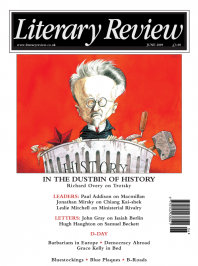Hugh Haughton
Not Yet I
The Letters of Samuel Beckett 1929–1940
By Martha Dow Fehsenfeld (ed) and Lois More Overbeck (ed)
Cambridge University Press 700pp £30
Samuel Beckett changed the ways we see the world. He did so by transforming the genres we use to represent it, remaking them in the light of his grand inquisitorial playfulness. Despite his endlessly self-effacing way of writing, plays like Endgame, novels like Molloy, and a host of inscrutable poems, essays and prose fragments, bear his unmistakable signature. They announce on every page: Beckett was here.
It is perhaps paradoxical that such a minimalist should have had such a maximal effect, and an opponent of biographical readings of art such a high biographical profile (witness the big biographies by Deirdre Bair, Anthony Cronin and James Knowlson, and innumerable iconic photos). Beckett was a prolific

Sign Up to our newsletter
Receive free articles, highlights from the archive, news, details of prizes, and much more.@Lit_Review
Follow Literary Review on Twitter
Twitter Feed
It wasn’t until 1825 that Pepys’s diary became available for the first time. How it was eventually decrypted and published is a story of subterfuge and duplicity.
Kate Loveman tells the tale.
Kate Loveman - Publishing Pepys
Kate Loveman: Publishing Pepys
literaryreview.co.uk
Arthur Christopher Benson was a pillar of the Edwardian establishment. He was supremely well connected. As his newly published diaries reveal, he was also riotously indiscreet.
Piers Brendon compares Benson’s journals to others from the 20th century.
Piers Brendon - Land of Dopes & Tories
Piers Brendon: Land of Dopes & Tories - The Benson Diaries: Selections from the Diary of Arthur Christopher Benson by Eamon Duffy & Ronald Hyam (edd)
literaryreview.co.uk
Of the siblings Gwen and Augustus John, it is Augustus who has commanded most attention from collectors and connoisseurs.
Was he really the finer artist, asks Tanya Harrod, or is it time Gwen emerged from her brother’s shadow?
Tanya Harrod - Cut from the Same Canvas
Tanya Harrod: Cut from the Same Canvas - Artists, Siblings, Visionaries: The Lives and Loves of Gwen and Augustus John by Judith Mackrell
literaryreview.co.uk